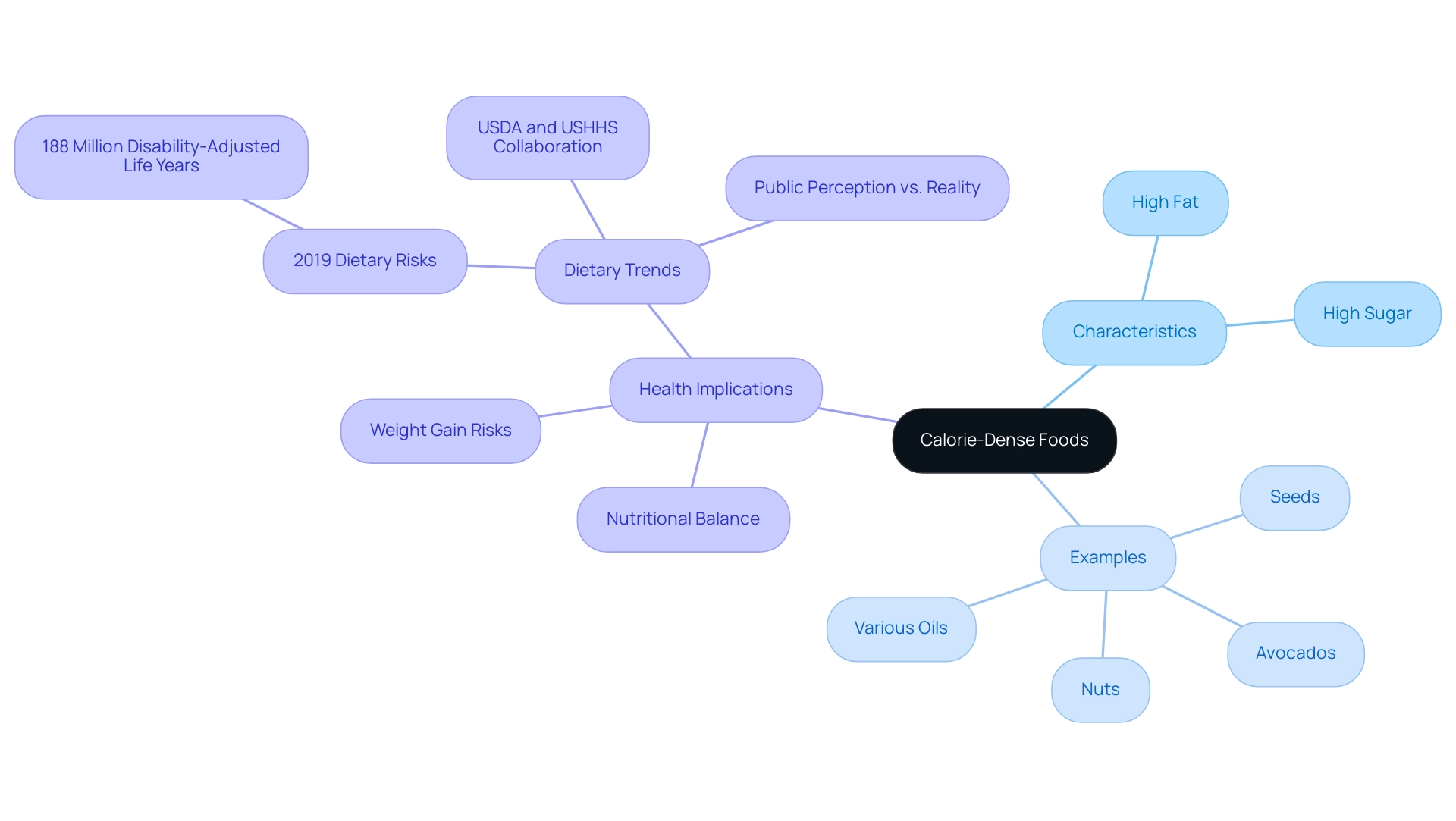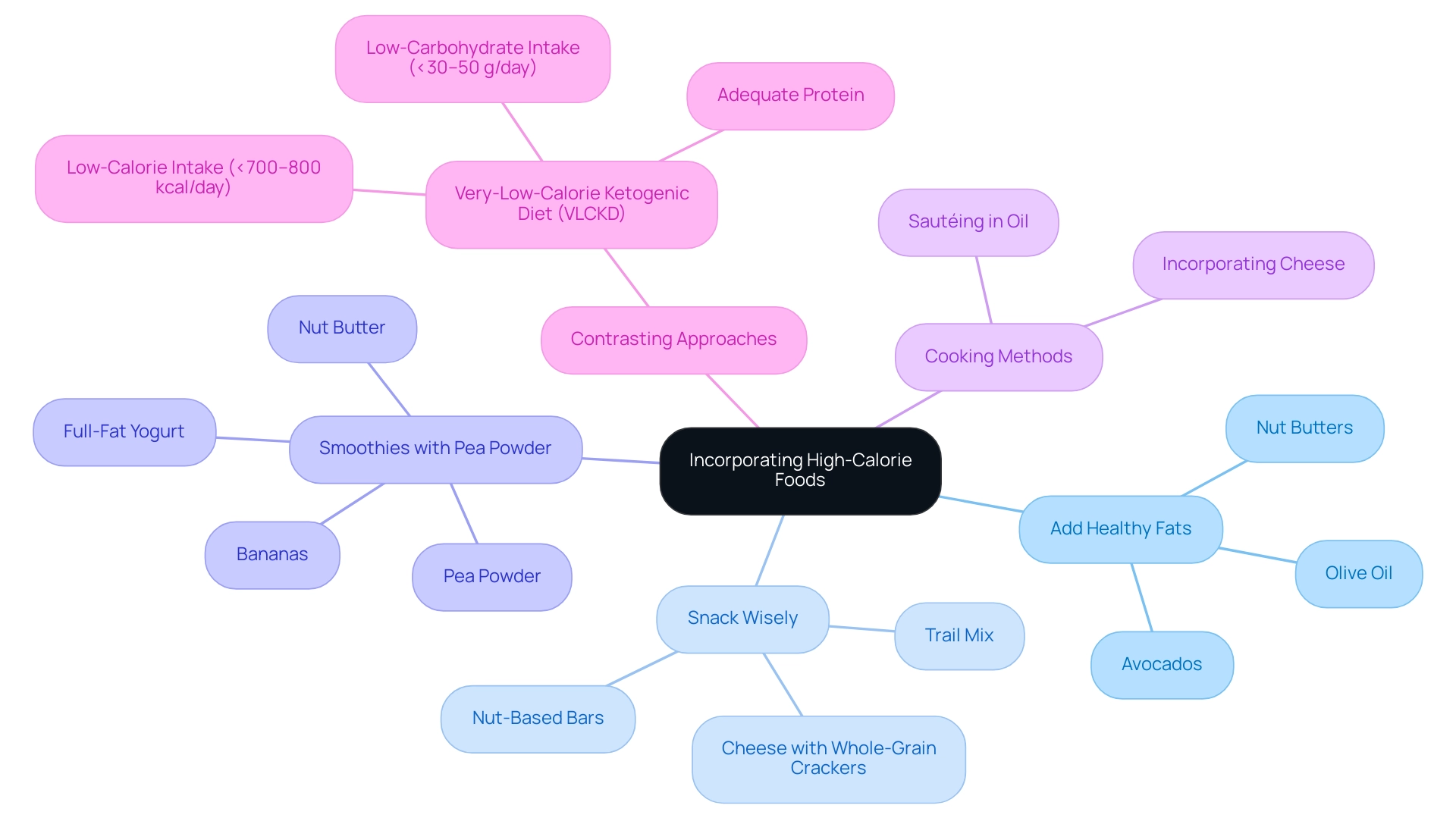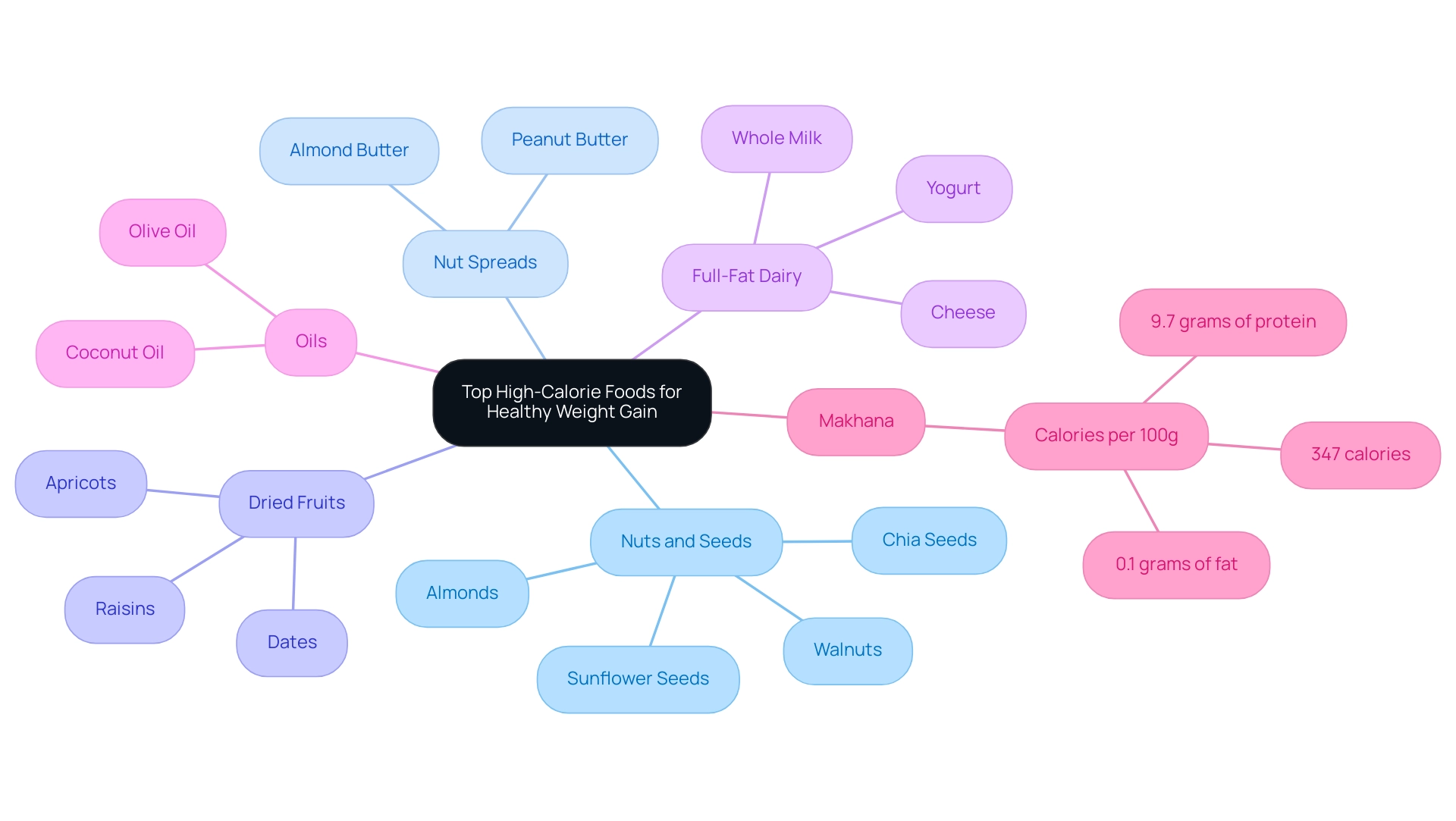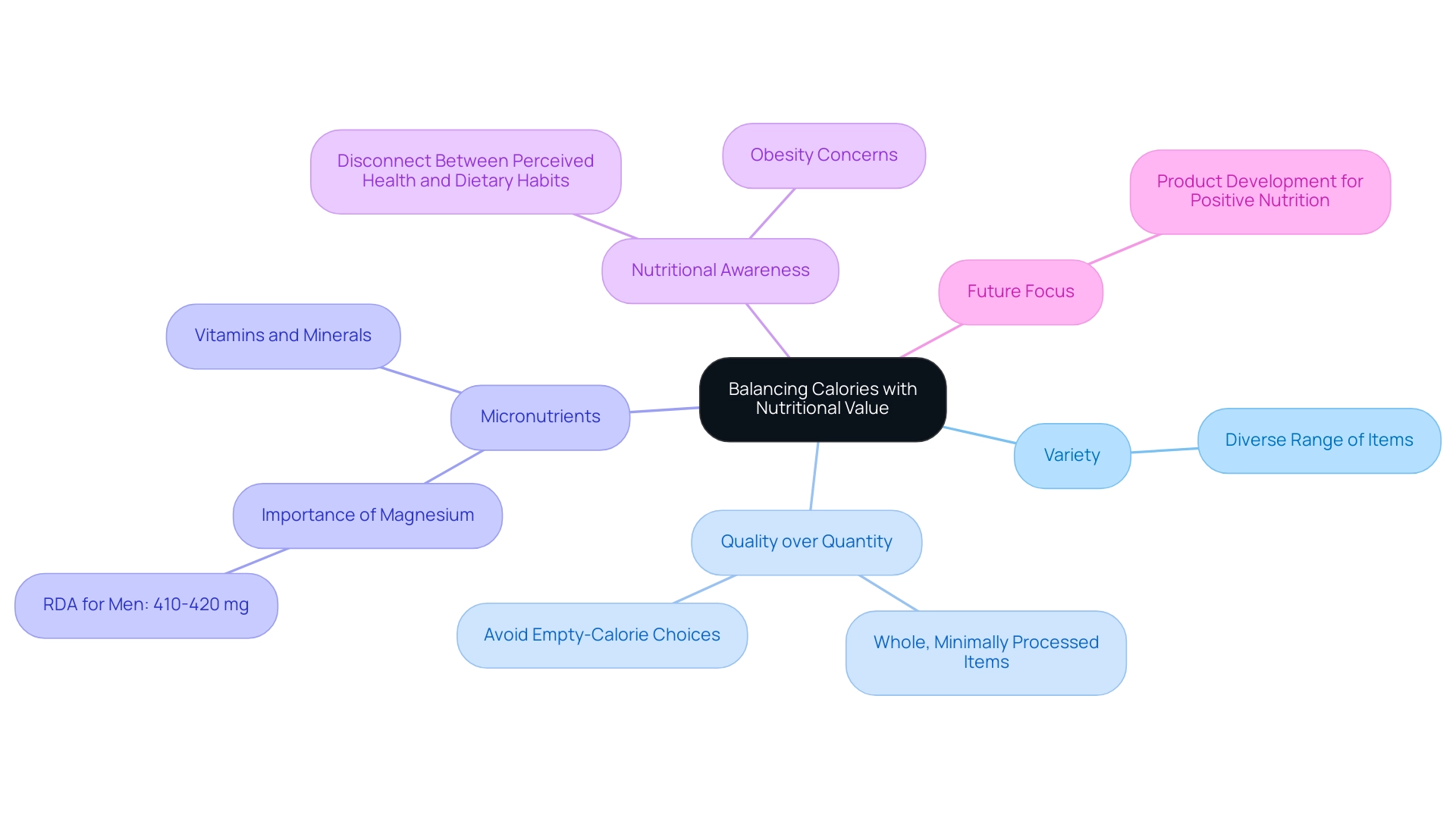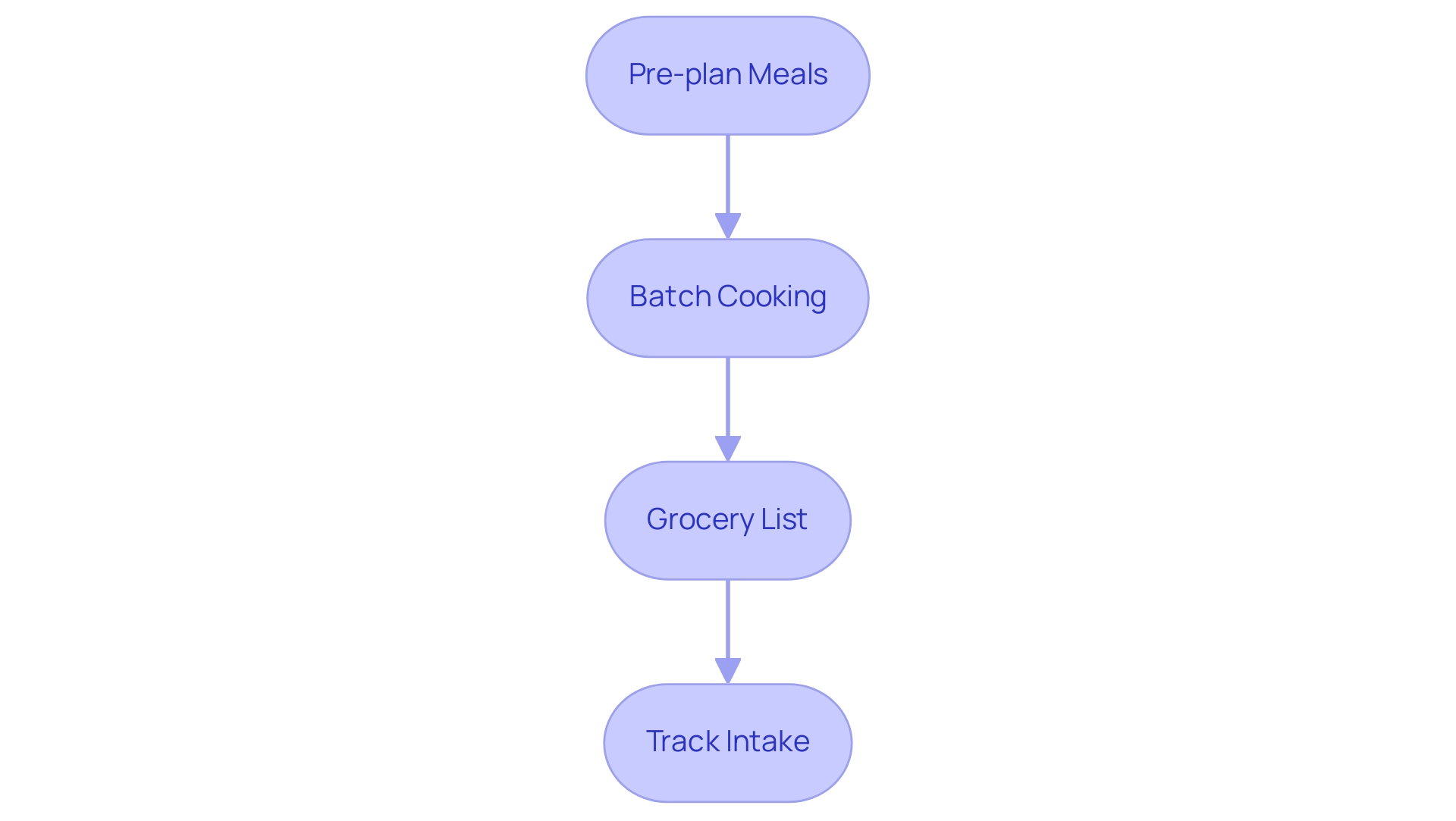Introduction
In the quest for healthy weight gain, understanding the role of calorie-dense foods is essential. These foods, characterized by their high caloric content, can be both beneficial and challenging to navigate. While they offer a means to increase caloric intake, it is crucial to balance these choices with nutritional value to ensure that the body receives essential vitamins and minerals.
As dietary habits evolve, awareness of the implications of calorie density becomes increasingly important, especially in light of recent studies linking poor dietary choices to significant health risks.
This article delves into effective strategies for incorporating high-calorie foods into daily meals, highlights top options for healthy weight gain, and emphasizes the importance of meal planning to achieve desired health outcomes.
By fostering informed dietary practices, individuals can work towards their health goals while enjoying a diverse and satisfying diet.
1. Understanding Calorie-Dense Foods: The Basics
High calorie foods are characterized by a high caloric content per serving, primarily attributed to their fat or sugar composition. Common examples of such items include:
- Nuts
- Seeds
- Avocados
- Various oils
Understanding the balance between calorie density and nutrient density is vital for health-conscious individuals.
While high calorie foods can contribute to weight gain if consumed in excess, it is essential to prioritize options that also deliver essential vitamins, minerals, and other nutrients. As Nancy Brown, CEO of the American Heart Association, emphasized at a recent conference, the future role of nutrition is critical in averting health crises, highlighting the necessity for informed dietary choices. This nuanced understanding aids individuals in making conscious decisions that align with their health goals, ultimately fostering a healthier population.
Moreover, a review of recent studies indicates a growing concern regarding the consumption of high calorie foods, as dietary risks from these items contributed to 188 million disability-adjusted life years in 2019. The collaboration between the USDA and the U.S. Department of Health and Human Services on the WWEIA/NHANES surveys provides ongoing insights into
dietary trends, reinforcing the significance of nutrient-dense diets in combating obesity and related health issues. Additionally, a case study reveals that while nearly half of Americans consider their health to be excellent or very good, there is a notable disconnect between self-perception and actual dietary habits, highlighting the need for awareness and education.
The upcoming updates from these agencies in 2026 will further shed light on these dietary trends, emphasizing the importance of staying informed about nutritional guidelines.
2. Effective Strategies for Incorporating High-Calorie Foods into Your Diet
To effectively integrate high calorie foods into your diet, consider implementing the following strategies:
-
Add Healthy Fats: Incorporate nutrient-rich options such as avocados, nut butters, and olive oil into your meals and snacks to enhance flavor and caloric density. The Mediterranean diet, known for its benefits in weight loss and cardiometabolic health, emphasizes the importance of healthy fats.
-
Snack Wisely: Choose energy-dense snacks such as trail mix, cheese with whole-grain crackers, or nut-based bars between meals to maintain energy levels and boost overall intake. According to recent statistics, calorie-dense snacks can significantly contribute to daily caloric goals.
-
Smoothies with Pea Powder: Create nutrient-packed smoothies by blending high-calorie ingredients, such as bananas, nut butter, full-fat yogurt, and a scoop of pea powder. This combination serves as a convenient and tasty method to increase your daily intake while benefiting from the protein content of peas.
-
Cooking Methods: Employ cooking techniques that add calories without significantly increasing meal volume, such as sauteing vegetables in oil or incorporating cheese into dishes. As Ju Young Kim, a member of the Editorial Board of the Journal of Obesity & Metabolic Syndrome, observes, incorporating high-calorie foods can be beneficial for management strategies.
Additionally, considering contrasting approaches like the Very-Low-Calorie Ketogenic Diet (VLCKD), which proposes a low-calorie intake for severe obesity, can provide a broader perspective on dietary options. These strategies not only encourage gain but also ensure that your diet remains
nutritious and satisfying. Incorporating pea protein into your meals not only enhances the caloric content but also provides essential amino acids, making it an excellent choice for those following a plant-based lifestyle.
3. Top High-Calorie Foods for Healthy Weight Gain
For those seeking healthy weight gain, incorporating calorie-dense items into the diet is essential. Below is a compilation of some of the top high calorie foods to consider:
-
Nuts and seeds: Varieties such as almonds, walnuts, sunflower seeds, and chia seeds are considered high calorie foods that are also packed with nutrients, making them an excellent choice for enhancing caloric intake.
-
Nut spreads: Peanut butter and almond butter are flexible enhancements that can enhance smoothies, toast, and baked items, offering a substantial increase in energy and nutrients.
-
Dried fruits: High calorie foods such as dates, raisins, and apricots serve as nutritious snacks and can easily be included in salads or cereals, helping to increase daily caloric consumption.
-
Full-fat dairy: This includes high calorie foods like whole milk, yogurt, and cheese, which are abundant in energy and nutrients, aiding in a balanced diet for gaining mass.
-
Oils: Incorporating healthy fats like olive oil and coconut oil into meal preparation not only enhances flavor but also significantly boosts the
energy content of high calorie foods.
-
Makhana: This nutrient-rich item provides 347 calories, 9.7 grams of protein, and only 0.1 grams of fat per 100 grams, making it a beneficial inclusion in any gain plan.
As noted by Dr. Alana Biggers, 'Weight loss after illness from COVID-19 is more common,' highlighting the importance of maintaining a nutritious diet. Considerate incorporation of these items into your daily routine can promote healthier increases while ensuring nutritional sufficiency.
It is also recommended to consult with a registered dietitian or healthcare provider to create a sustainable plan tailored to individual needs.
4. Balancing Calories with Nutritional Value: What to Consider
Balancing high calorie foods with nutritional value is crucial for those aiming for healthy weight gain. While it may be tempting to boost energy consumption through high-energy snacks, it is essential to prioritize items rich in vital vitamins, minerals, and macronutrients. For example, although a chocolate bar can significantly boost caloric intake, it typically lacks the necessary nutrients that contribute to overall health.
Instead, consider whole items that naturally contain high calorie foods, such as nuts, avocados, and fatty fish.
To effectively balance calories with nutrition, keep the following principles in mind:
- Variety: Incorporate a diverse range of items into your diet to ensure a comprehensive nutrient profile.
- Quality over quantity: Opt for whole, minimally processed items rather than empty-calorie choices that provide little nutritional benefit.
- Micronutrients: Focus on obtaining adequate vitamins and minerals alongside macronutrients, as these micronutrients are vital for overall health.
For instance, the recommended daily allowance (RDA) for magnesium ranges from 410 to 420 milligrams for men, highlighting the importance of this micronutrient in a balanced diet. This balanced approach not only facilitates healthy weight gain but also supports long-term well-being. The need for nutritional awareness is underscored by recent findings indicating that, despite nearly half of Americans rating their health as excellent or very good, many are still struggling with dietary habits that contribute to obesity. This disconnect between perceived health and actual dietary practices reinforces the importance of making informed nutritional choices.
As Bearden aptly states, as long as you are consuming a balanced diet with sufficient nourishment, you should be getting enough magnesium to reap its overall health benefits.
Therefore, emphasizing the
nutritional quality of high calorie foods, particularly in high-calorie diets, is paramount as we move into 2025.
5. Meal Planning for Weight Gain: Tips and Tricks
Strategic meal planning plays a crucial role in achieving healthy weight gain, especially when integrating nutritious options like pea powder, which is not only a high-quality source of nutrients but also sustainable and ethical. Here are several effective strategies to consider:
-
Pre-plan Meals:
Allocate time each week to thoughtfully plan meals and snacks, ensuring they prominently feature high calorie foods that support your caloric goals.
For example, to
boost your daily consumption to 3,000 units, think about including a small pear and an additional cup of rice at dinner, along with a portion of pea supplement to improve muscle recovery and energy. Pea extract provides a similar nutrient content to animal sources, making it an excellent choice for muscle building.
-
Batch Cooking:
Prepare substantial quantities of meals that can be divided into portions for the week, allowing for convenience and consistency in your diet. This approach not only saves time but also aids in sustaining a balanced consumption of energy.
-
Grocery List:
Develop a shopping list focused on high calorie foods, including nutrient-dense items like pea protein products, which will serve as the foundation for your meal preparations.
-
Track Intake:
Use a meal diary or a nutrition tracking application to monitor both calorie and nutrient consumption, allowing you to make necessary adjustments to achieve your gain objectives.
As Katherine Zeratsky, R.D., L.D., notes, "There also are medicines that help boost the feeling of hunger," which can be considered alongside these strategies. Additionally, maintaining hydration is vital for muscle mass gain, as highlighted in a case study that emphasizes the importance of drinking at least 2.5 liters of water per day. It is advised to drink water between meals, as consuming it with food may disrupt digestion.
By implementing these meal planning strategies and incorporating the advantages of pea nutrients, you can establish a structured approach that will enhance your efforts toward achieving healthy weight gain. For those looking to optimize their nutrition, consider purchasing high-quality pea protein products to support your journey.
Conclusion
Incorporating calorie-dense foods into a diet can significantly aid in achieving healthy weight gain, but it requires a thoughtful approach. The article outlines the importance of understanding calorie density versus nutrient density, emphasizing that while high-calorie foods can help meet caloric goals, they should not compromise nutritional value. Strategies such as:
- Adding healthy fats
- Selecting nutrient-rich snacks
- Utilizing cooking methods that enhance caloric content without increasing meal volume
are essential for creating a balanced diet.
Selecting the right high-calorie foods is just as crucial. Nuts, seeds, nut butters, dried fruits, full-fat dairy, and various oils provide not only the necessary calories but also essential nutrients. The emphasis on whole, minimally processed foods ensures that calorie intake supports overall health rather than detracting from it. Additionally, the importance of meal planning cannot be overstated; pre-planning meals and using batch cooking can simplify the process of maintaining a high-calorie, nutrient-dense diet.
Ultimately, the goal is to foster informed dietary practices that facilitate healthy weight gain while ensuring adequate nutrient intake. By prioritizing quality over quantity and being mindful of food choices, individuals can effectively navigate the complexities of calorie-dense foods. This balanced approach supports not just weight gain, but long-term health and well-being, underscoring the necessity for awareness and education in dietary habits. Embracing these principles can lead to a more satisfying and health-conscious eating experience.
